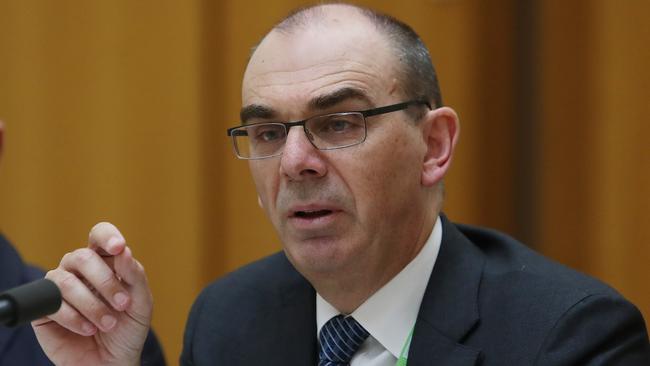Climate change a focus for prudential regulator APRA as Covid rages
APRA chairman Wayne Byres has said the financial system has emerged from a turbulent year in good health.

Business
Don't miss out on the headlines from Business. Followed categories will be added to My News.
Climate change will remain a key strategic focus for the Australian Prudential Regulation Authority, which said the financial system was strong enough to withstand the challenges posed by the global pandemic.
In APRA’s corporate plan for 2021-25, released on Thursday, chairman Wayne Byres said the nation had demonstrated great strength and resilience through the crisis.
“Australia’s economy rebounded faster than originally expected to the adverse events of 2020, aided by supportive policy settings, and the financial system has emerged from a turbulent year in good health,” Mr Byres said.
“The challenges and uncertainty created by the pandemic remain, but the financial system appears well-equipped to handle them.”
On climate change, APRA said it would continue working on improving the level of understanding and management of financial risks associated with global warming.
This included finalising prudential guidance, conducting climate vulnerability assessments, data gathering and further engagement with Council of Financial Regulator agencies, industry bodies, research organisations and global regulatory peers.
The assessments start with the big four banks and will eventually be rolled out to the rest of the banking, insurance and superannuation sectors.
In its previous, 2020-24 corporate plan with the economy under severe stress, APRA narrowed its short-term priorities to focus on three key issues: reinforcing the soundness of regulated entities, increasing their operational resilience, and enhancing contingency plans to address the escalating risk of failure.
While Covid-19 remained a dominant influence on the environment, APRA said it was far from the only important factor.
The corporate plan said the global financial landscape was evolving at an increasing pace, with new business models emerging, new technology under development and being deployed, and an acceleration in digital finance.
New entrants, platforms, channels, products and services and the use of outsourcing were all gaining momentum.
Digital currencies, wallets, stored value and payment methods were challenging the role of financial institutions, with data transformation rapidly accelerating with the use of artificial intelligence.
This was helping to make decision-making quicker and more automated.
Meanwhile, consumers had greater choice, expressing their preference for digital channels in their consumption of financial services.
Traditional regulatory boundaries and approaches worldwide were under constant challenge, and Australia’s prudential architecture needed to respond and adapt but within a framework which continued to safeguard the system’s stability.
In addition to understanding the financial risks of climate change, APRA said it would continue to work with other agencies and stakeholders to deliver superior results in the retirement income sector.
It would also seek to address affordability and availability issues in insurance across the general, life and private health insurance sectors.
More broadly, the regulator’s business as usual activities would help preserve the resilience of banks, insurers and superannuation funds.
The capital strength of the banking industry would be underpinned by completing the implementation of the Basel III initiatives and “unquestionably strong” benchmark from the financial system inquiry.
APRA would also ensure that the banks were operationally resilient, and support the ongoing development of credible recovery plans.
Insurers would have to strengthen governance and risk management practices, including responses to lessons learned from Covid-19.
With super, the prudential regulator would drive implementation of the Your Future, Your Super reforms, and act on superannuation entities failing to meet their new obligations.
It would ensure the industry eradicates unacceptable produce performance by conducting the new annual performance test under the reforms, and publishing performance-based heatmaps to support transparency.
Mr Byres said the updated corporate plan aimed to ensure regulated entities were equipped to deal with “existing, emerging and future trends and risks”, whether it was the growing spectre of cyber threats, continued access to affordable insurance, or the emergence of new technologies and market disrupters.
More Coverage
Originally published as Climate change a focus for prudential regulator APRA as Covid rages





